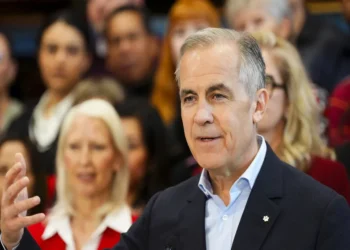President Donald Trump made history by nominating award-winning investigative reporter Sara Carter to be the first female director of the Office of National Drug Control Policy. If confirmed, she will become the administration’s chief spokesperson on drug policy and have statutory control over the whole of the federal government’s drug policy budget, spread across multiple agencies.
Carter brings with her a deep understanding of America’s border crisis and the dangerous drugs that are flowing over the border into communities across the nation. She’s also a mother of six, who likely appreciates how reducing perceptions of harm when it comes to drug use and predatory industries can hook new generations of users. Carter certainly understands that for young people, drug use is particularly damaging.
The challenges she faces are significant. Despite the colloquial title of “drug czar,” or in this case “czarina,” Carter’s position has been increasingly relegated to the background of this national fight. This wasn’t how it was meant to be. Congress created the position of drug czar to coordinate the often-disjointed efforts of the government to prevent dangerous drug use, trafficking, and addiction.
With more than 21,000 pounds of fentanyl, 68,000 pounds of cocaine, and 175,000 pounds of marijuana seized at the southern border last year, Carter’s task will be significant. That’s before she addresses the illicit drug market that’s proliferating as states across the nation continue to be hoodwinked by marijuana profiteers who herald legalization as a tax boon and social justice bonanza — when in reality, it is a costly and dangerous policy.
Here are three ways Carter can make a lasting impact upon her confirmation.
First, a nationwide barnstorming campaign: Carter is a former investigative reporter at a major network with extensive media experience who should take a page out of Trump’s campaign playbook and maximize the power of the bully pulpit. She should use her unique skillset to her advantage and travel the country, press in tow, to show the real toll illicit drugs peddled by foreign adversaries and the addiction industry are having on communities in every state. Bringing a new anti-drug message to parents, law enforcement, educators, and medical professionals will engage key stakeholders in pushing back against the drug crisis. Carter is well suited to deliver this message via a mass media campaign that connects with people.
Second, prioritizing the National Drug Control Strategy: The ONDCP director should use the full power of her position and chair a “drug Cabinet” convened by Trump, consisting of appropriate Cabinet secretaries and other senior officials who drive the execution of a coordinated national drug policy. In the spirit of the Department of Government Efficiency, Carter should mandate that departments bring forth specifics about how they are fulfilling the directives laid out in the country’s annual National Drug Control Strategy and how they can ensure resources are being spent where they’re most needed. Departments, initiatives, and, yes, budgets should be judged on their effectiveness by which they are fulfilling their statutory mission.
LEGISLATION TARGETS RECOVERY GAPS AS VIRGINIA DRUG CASES CLIMB
Third, make it clear that drugs aren’t making America great or healthy again. With today’s scientific evidence behind the harms of marijuana and other illicit drugs, it’s increasingly clear you can’t truly want to make America healthy again and think more drugs in our communities is a good thing. The addiction industry, which is fueling a rise in increasingly potent and dangerous drugs, and illicit drugs pushed by cartels are responsible for a public health crisis. Many of these drugs, including marijuana and THC-infused products such as edibles, vapes, waxes, and dabs, are now medically proven to cause IQ loss, psychosis, schizophrenia, depression, suicidality, and, of course, addiction. Carter can ensure that people understand that Big Tobacco has become Big Marijuana and that the drug landscape has changed.
The ONDCP should remain a small, nimble policy office, but Carter can go big with ideas and execution. She can deftly use the power of the purse, today’s increasingly settled science on drug use, and the bully pulpit to save lives. Let’s hope she does it. All people should be cheering her on.
Kevin A. Sabet, Ph.D., served in the Office of National Drug Control Policy under former Presidents Bill Clinton, George W. Bush, and Barack Obama and is the president of the Foundation for Drug Policy Solutions and Smart Approaches to Marijuana.















